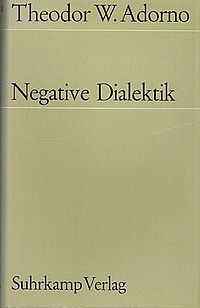 Cover of the first edition | |
| Author | Theodor W. Adorno |
|---|---|
| Original title | Negative Dialektik |
| Translator | E. B. Ashton |
| Language | German |
| Subject | Philosophy |
| Publisher | Suhrkamp Verlag |
Publication date | 1966 |
| Media type | |
| Pages | 416 (Routledge edition) |
| ISBN | 0-415-05221-1 (Routledge edition) |
| Part of a series on the |
| Frankfurt School |
|---|
 |
Negative Dialectics (German : Negative Dialektik) is a 1966 book by the philosopher Theodor W. Adorno, in which he presents a critique of traditional Western philosophy and dialectical thinking. Adorno argues that the Enlightenment's emphasis on reason and progress has led to the domination of nature and the suppression of human individuality, and he develops the notion of negative dialectics as a critique of the positive, idealistic dialectics of Hegel and the Marxist dialectical materialism that grew out of it.
Contents
Negative dialectics rejects the idea of a final synthesis or reconciliation, instead emphasizing the importance of maintaining the tension between contradictory elements and resisting the temptation to subsume particulars under abstract, totalizing concepts.
Central to Adorno's argument is his reflection on the Holocaust and the systematic extermination of the Jews at Auschwitz, which he sees as a catastrophic failure of Enlightenment rationality and a profound challenge to the very foundations of philosophical thought. [1] [2] He argues that the experience of Auschwitz demands a fundamental rethinking of the Western philosophical tradition and a new form of critical theory that can grapple with the ethical and metaphysical challenges posed by the Holocaust, writing that a "new categorical imperative has been imposed by Hitler upon unfree mankind: to arrange their thoughts and actions so that Auschwitz will not repeat itself, so that nothing similar will happen." [3] [4]